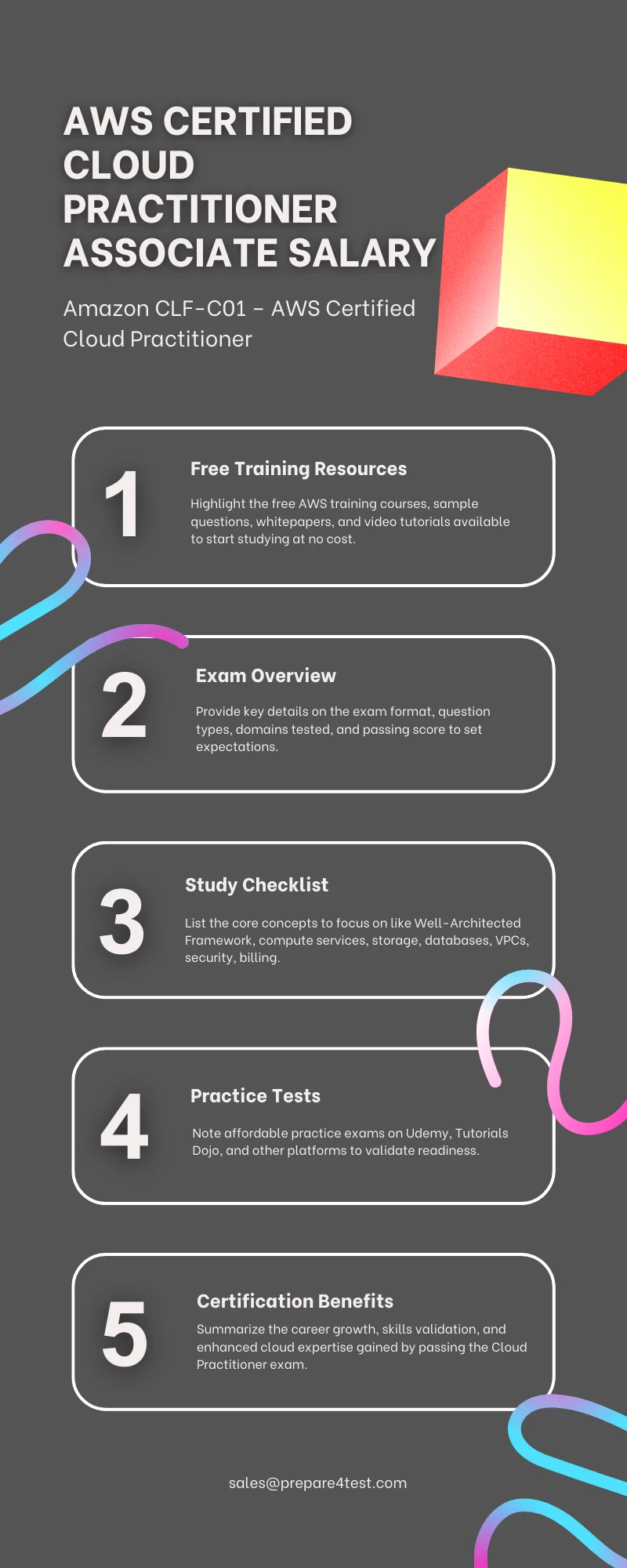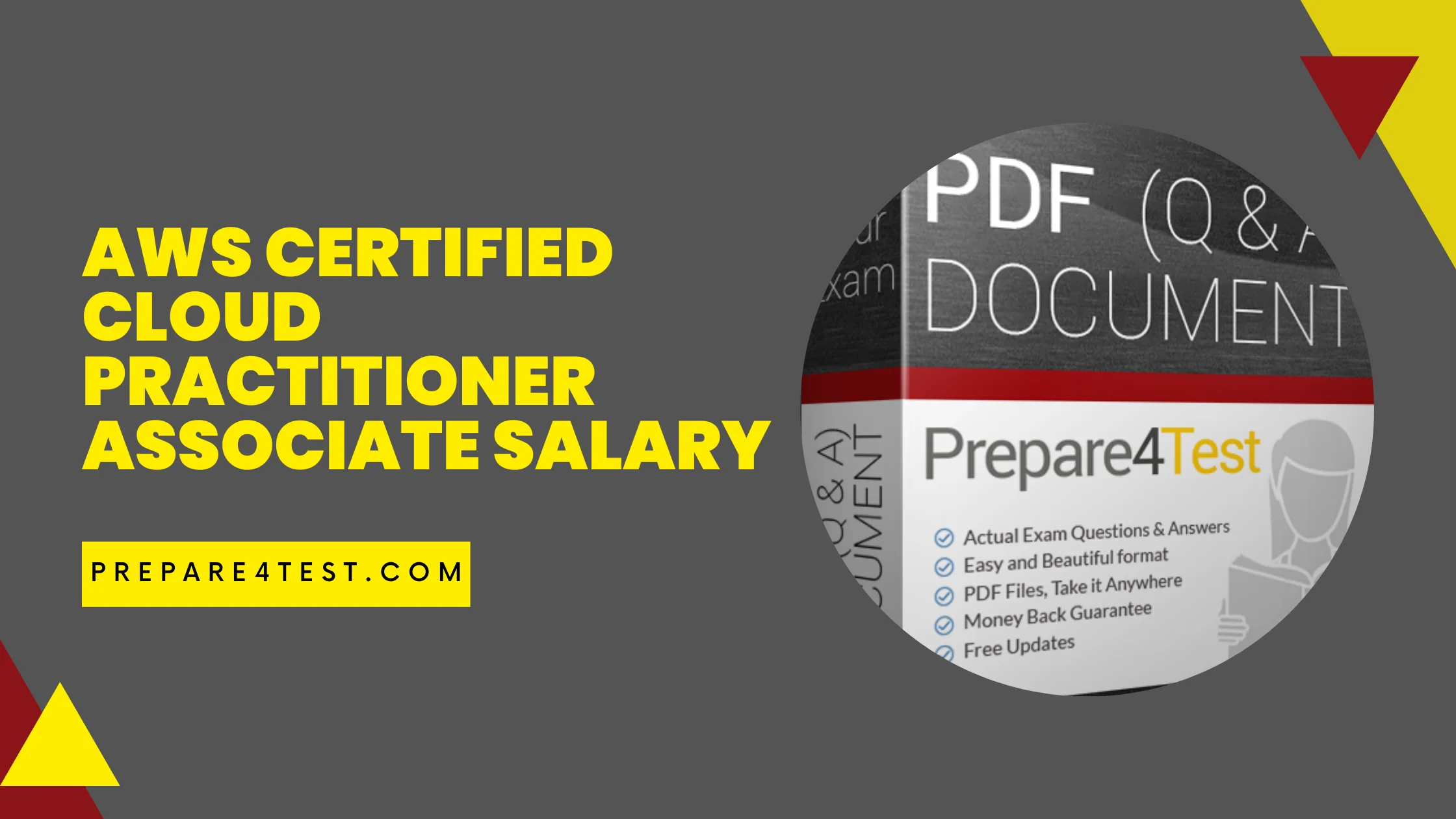
As cloud computing continues its rapid growth, becoming an AWS Certified Cloud Practitioner is a great way to start a well-paid career in this exciting field. This foundational certification validates cloud fluency and an overall understanding of AWS services, preparing you for roles with an average salary of $85,866 per year in the United States.
In this text, we will explore the AWS cloud practitioner role and responsibilities, industries hiring these professionals, exam details you need to know to get certified, career opportunities, and salary outlook across different roles. Whether you are new to the cloud or looking to formalize your skills, read on to determine if the AWS Certified Cloud Practitioner is the right path for you.
To start, what exactly does an AWS cloud practitioner do? These IT professionals have a strong grasp of cloud computing concepts and how AWS provides on-demand delivery of computing power, storage, databases, and other IT resources through cloud services. Key responsibilities include demonstrating the business value of AWS to organizations, migrating workloads to the cloud, following AWS best practices for security and architecture, and identifying issues with AWS environments.
Though no prior AWS experience is required, cloud practitioners collaborate with developers, solutions architects, and sysops administrators to ensure workloads run efficiently on the AWS platform. They play an important role in removing obstacles to cloud adoption and maximizing the benefits of moving to the cloud.
Now let’s explore top industries hiring AWS cloud practitioners and details about the certification exam.
AWS Cloud Practitioner Role
As cloud adoption accelerates, AWS cloud practitioners play a crucial role in demonstrating the business value of AWS and guiding organizations through cloud migrations. Though no prior AWS experience is required for this role, cloud practitioners possess a strong grasp of cloud computing concepts and AWS services like compute, storage, databases, analytics, security, and more.
Key responsibilities include optimizing existing workloads on AWS, recommending new cloud-based solutions to improve efficiency, and performing assessments to identify high-risk areas. Practitioners also ensure AWS environments meet security and compliance requirements.
Collaborating with developers, solutions architects, and sysops admins, AWS cloud practitioners remove obstacles to cloud adoption and maximize benefits. They serve as a bridge between technical and business teams, aligning technology decisions with business goals.
With their broad understanding of the AWS platform, cloud practitioners can identify issues and troubleshoot problems across various workloads. They are continually updated on the latest AWS features to provide expert guidance.
Though not architects or engineers, AWS cloud practitioners play an integral part in cloud migration projects and optimizing cloud utilization. Their skills prepare them to advance to more specialized technical roles down the line.
Industries Hiring AWS Cloud Practitioners
AWS cloud skills are valuable across many industries:
Healthcare
As healthcare facilities work to boost patient satisfaction, AWS cloud skills are becoming highly sought-after. Healthcare providers can leverage AWS services to securely store electronic health records, analyze patient data, and develop telehealth platforms.
For example, AWS storage services like S3 and DynamoDB allow healthcare companies to store enormous amounts of patient data in a durable and scalable way. Machine learning tools like SageMaker help uncover insights from this data to improve diagnoses and treatment plans.
AWS also enables building robust telehealth solutions to increase patient access to medical expertise. Features like auto-scaling allow telehealth platforms to easily manage spikes in demand.
Compliance is also simplified on AWS. Services like AWS Artifact provide on-demand access to compliance reports and AWS’s Business Associate Addendum ensures HIPAA requirements are met.
With healthcare data security and privacy being paramount, AWS offers encryption, access controls, and advanced threat detection capabilities. This allows organizations to operate securely in the cloud.
As healthcare moves towards value-based care, analytics, and patient-centric models, AWS cloud skills will be imperative. Cloud practitioners can guide providers through digital transformation initiatives to improve quality of care.
Retail and eCommerce
As consumers continue to flock online for shopping, AWS cloud skills have become extremely valuable in the retail and eCommerce industry. Retailers can leverage AWS to store enormous product catalogs in S3 and DynamoDB which offer durable, scalable storage.
Powerful data analytics services like Amazon Personalize allow retailers to uncover customer insights and provide personalized product recommendations to boost sales. Auto-scaling on AWS enables eCommerce sites to easily manage traffic spikes during peak seasons like Black Friday.
AWS also enables innovative virtual shopping experiences through augmented reality, 3D product previews, and virtual stores. This allows customers to digitally try on products before buying. Immersive shopping experiences build confidence and improve conversion rates for retailers.
To optimize order fulfillment, AWS offers real-time inventory visibility and agile logistics capabilities across channels. This facilitates buy-online, pickup-in-store and curbside pickup capabilities.
With a flexible pay-as-you-go model, AWS makes it easy for retailers to scale up cloud resources during peak periods and scale back down during slower seasons to optimize costs.
As consumer expectations evolve, retailers are using AWS to rapidly roll out new features and shopping experiences to stay competitive. AWS’s network of partners also provide purpose-built retail solutions to accelerate digital transformation.
Retailers can also leverage AWS training and practice exams like AWS Certified Cloud Practitioner Practice Exams and AWS Certified Cloud Practitioner Exam Guide to prepare their teams with cloud skills needed for digital transformation initiatives. With innovative capabilities like virtual stores, augmented reality, and robust analytics, AWS empowers retailers to engage customers in new ways and optimize operations from end to end.
Finance
As finance organizations aim to improve security, reduce costs, and enable innovation, AWS cloud skills are becoming highly sought-after. AWS enables performing real-time risk analysis and fraud detection using data analytics services like Amazon QuickSight. Global edge locations provide low latency for financial transaction.
AWS also simplifies regulatory compliance for finance companies. Services like AWS Artifact provide on-demand access to compliance reports and audits. Features like encryption, access controls, and configuration management aid in governance.
The AWS Cloud facilitates rapid development of new financial products and services. Fintech companies can leverage AWS to quickly build and launch applications using microservices and APIs. This agility allows delivering differentiated customer experiences.
The pay-as-you-go model reduces upfront infrastructure costs for finance organizations. Auto scaling optimizes resource usage during fluctuating workloads. This prevents over provisioning and saves money.
As finance moves toward real-time data analytics, machine learning, and customer-centric models, cloud skills are imperative. AWS training like AWS Certified Cloud Practitioner 2022 en Español and 500 AWS Certified Cloud Practitioner Practice Exam Questions equip finance teams with the knowledge to innovate on the cloud.
AWS Certified Cloud Practitioner Exam Details

People who want to get the certification must pass the CLF-C01 test, which tests knowledge across 4 domains:
- Cloud Concepts (26%) – Benefits of cloud computing, AWS cloud value proposition, cloud economics, billing and pricing models
- Security and Compliance (25%) – AWS shared responsibility model, AWS security services, data encryption, and infrastructure security
- Technology (33%) – Global infrastructure, core AWS services, networking, storage, and databases.
- Billing and Pricing (16%) – AWS account setup, support plans, and cost management tools
The exam has 65 multiple-choice and multiple-response questions. No prior AWS experience is required, but some understanding of IT services and cloud computing concepts is recommended.
There are 15 unscored questions that don’t impact your score. AWS uses these to evaluate questions for future exams.
The exam is offered at testing centers globally. Schedule it as soon as you feel ready after thoroughly preparing. Arrive early, well-rested, and ready to demonstrate your AWS cloud knowledge. Resources like AWS Certified Cloud Practitioner 500 Practice Exam Questions can help you get exam-ready.
Career Opportunities and Salary Outlook
The AWS Certified Cloud Practitioner opens up various lucrative career paths in cloud computing. AWS cloud practitioners who are just starting out in the US make an average of $85,866 per year, according to ZipRecruiter.
With more experience and higher certifications, salaries can reach over $130,000 annually. Some potential job roles and average salaries for AWS cloud practitioners include:
- AWS Cloud Engineer – $107,043
- AWS DevOps Engineer – $112,688
- AWS Cloud Architect – $132,235
- AWS SysOps Administrator – $69,397
- AWS Developer – $95,220
The top cities in the US for high AWS cloud practitioner salaries are Santa Clara, San Francisco, New York City, and Washington DC where average salaries exceed $100,000.
As businesses accelerate their adoption of AWS, cloud practitioner skills will continue to be in high demand across industries like healthcare, finance, retail, manufacturing, and more. Certified practitioners can showcase their cloud fluency to employers.
With foundational knowledge validated by the certification, AWS cloud practitioners can advance their careers and pursue more specialized roles down the line. The certification demonstrates an understanding of AWS services, security, architecture, pricing and support to build a career as a cloud engineer, architect, developer or administrator.
Conclusion
As cloud adoption accelerates, skills and certifications in AWS are becoming highly sought after by employers. The foundational AWS Certified Cloud Practitioner certification is an best place to start for anyone interested in beginning a career in cloud computing.
This introductory certification validates overall understanding of AWS services, security, architecture, pricing, and support. It demonstrates cloud fluency across concepts like high availability, fault tolerance, scalability, AWS storage, compute, and database services.

While no hands-on experience is required, the certification provides a strong baseline of cloud knowledge to build upon. It opens doors to potentially lucrative cloud roles like AWS solutions architect, DevOps engineer, sysadmin, and developer with average salaries exceeding $130,000.
With businesses rapidly migrating workloads to the cloud, certified AWS cloud practitioners will continue to be in high demand. Earning this entry-level certification shows commitment to a career in the cloud and sets you apart when applying for AWS roles.
For those looking to transition into the thriving cloud computing field, the AWS Certified Cloud Practitioner is the perfect starting point to validate fundamental skills. It delivers essential knowledge to take the next step towards associate-level certifications and advancing in the AWS ecosystem.
Citations:
https://d1.awsstatic.com/training-and-certification/docs-cloud-practitioner/AWS-Certified-Cloud-Practitioner_Exam-Guide.pdf https://michaeljanschiumo.medium.com/i-passed-the-aws-certified-cloud-practitioner-aws-ccp-in-3-days-heres-how-7b33d6d94f41

